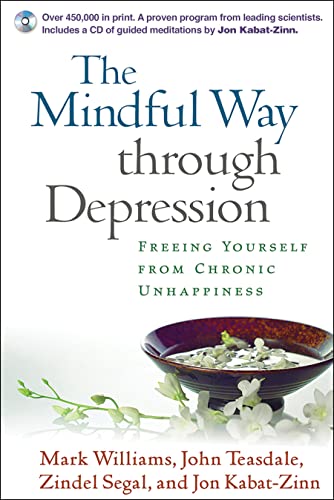The Mindful Way through Depression: Freeing Yourself from Chronic Unhappiness, by J. Mark G. Williams, explores mindfulness as a powerfully effective way to transform one’s relationship with chronic depression and unhappiness.
Understanding Depression
Depression is perceived as an endless downward spiral, and it can consume a person’s life.
Mindfulness is an alternative solution that can help individuals break free from this cycle by offering a fresh perspective on emotions, thoughts, and bodily sensations.
Moving Beyond Negative Patterns
Mindfulness enables the recognition of habitual negative thought patterns and helps individuals to see that their thoughts are merely transient occurrences in the mind.
By understanding this concept, they can learn to detach from the negative thoughts and prevent further rumination.
Sharing Mindfulness with Others
Mindfulness can be practiced as a group, providing an environment of support, understanding, and companionship.
Connecting with others who are also dealing with depression can help to foster empathy and shared growth.
Facing the Future
By incorporating mindfulness into daily life, individuals learn to overcome depressive thoughts, regulate emotions, cultivate a more positive approach, and ultimately, create a fulfilling life.
Maintaining a committed mindfulness practice fosters a sustainable path towards mental health, resilience, and well-being.
Mindful Meditation Practices
Daily mindfulness meditation exercises help strengthen the practice of being present.
Techniques such as body scanning, breathing exercises, and sitting meditation can aid in developing a stronger mind and a more balanced outlook on life.
Principle of Mindfulness
Mindfulness means paying attention non-judgmentally to the present moment.
By staying present and aware, one can better recognize negative thought patterns and emotions and learn to respond rather than react to them, allowing a shift from automatic negative responses to intentional, positive ones.
Cultivating Compassion
Developing a compassionate attitude towards oneself is crucial when dealing with depression.
Mindfulness encourages individuals to treat themselves with kindness and acceptance, fostering resilience and emotional well-being during difficult times.
The Power of Non-Judgment
Approaching one’s experiences with a non-judgmental mindset allows for acceptance and breaks the cycle of negativity, providing an opportunity to create positive change.
By acknowledging emotions and thoughts without judgement, individuals can gain control over their reactions.
Importance of Awareness
Being aware of one’s thoughts and emotions allows an individual to create space between the negative emotions and their reactions, enabling an appropriate response instead of being driven by urges and impulses associated with the depressive state.
Bodily Sensations and Depression
Depression is often manifested through physical symptoms and discomfort.
By practicing mindfulness, one can address these sensations and improve their connection to their body, thus reducing the feelings of despair and helplessness.


Member discussion: